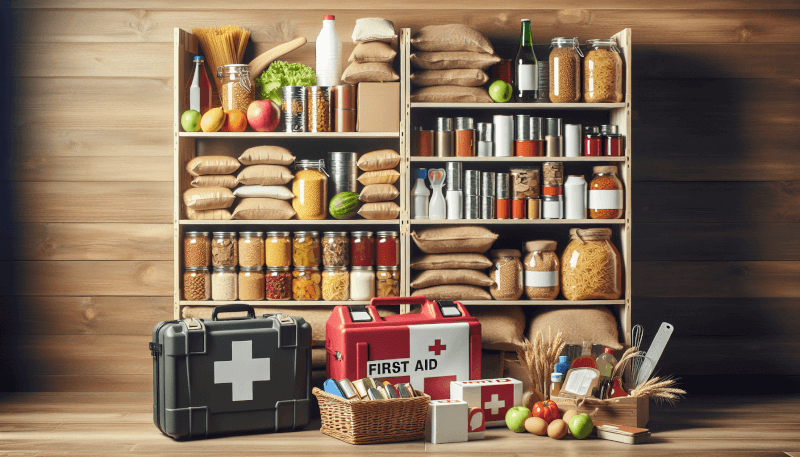In “Prepper’s Survival Medicine and Pantry: A Complete Guide on Medicine and Food Storage for your Family,” you will discover an essential resource that covers everything you need to know about preparing for unforeseen emergencies. From building a well-stocked pantry to essential medical supplies, this comprehensive guide provides valuable insights and practical tips to ensure the well-being of your family in challenging times. Join us as we explore the vital importance of being prepared and how you can create a safe and secure environment for your loved ones.
Medicine Storage
Importance of medicine storage
When it comes to storing medicine, it is essential to prioritize safety and effectiveness. Proper medicine storage ensures that your medications remain potent and in good condition, preventing them from losing their efficacy or becoming harmful. By following the recommended storage guidelines, you can maintain the quality of your medications, saving you both money and potential health risks.
Choosing the right storage containers
Selecting the appropriate storage containers for your medicine is crucial for maintaining its integrity. Look for containers that are airtight, opaque, and made of materials that won’t react with the medication. Avoid using glass containers as they can break and potentially contaminate your medicine. Plastic bottles or pill organizers with tight-fitting lids are often the best choice for most medications.
Organizing and labeling your medicine storage
Organizing and labeling your medicine storage is essential for easy access and convenience. By categorizing your medications, you can quickly locate what you need without wasting time searching through different containers. It is also crucial to label your medicine containers with the medication’s name, dosage, and expiration date. This helps prevent confusion and ensures that you are using your medications safely and appropriately.
Essential Medicines to Stockpile
Common over-the-counter medicines
Stocking up on common over-the-counter medicines is vital for addressing minor ailments and injuries during emergencies. Include pain relievers like acetaminophen or ibuprofen, antihistamines for allergies, cough and cold remedies, and bandages and wound care supplies. These medications can provide temporary relief and help you manage small health issues until professional medical help is available.
Prescription medicines
If you or your family members require prescription medications, it is crucial to have an adequate supply on hand in case of emergencies. Consult your healthcare provider to determine the appropriate quantity to stockpile and ensure that you follow proper storage guidelines for each medication. Remember to rotate your prescription medications regularly to avoid expiration and maintain their efficacy.
First aid supplies
In addition to medications, it is essential to have a well-stocked first aid kit that includes essentials like sterile gauze pads, adhesive bandages, antiseptic solutions, tweezers, and scissors. These supplies will come in handy for treating minor injuries and managing wounds until professional medical help is available. Keeping your first aid supplies organized and easily accessible is crucial for quick and efficient response during emergencies.

Long-Term Food Storage
Introduction to long-term food storage
Long-term food storage involves stockpiling non-perishable food items to ensure an adequate food supply during emergencies or disasters. This preparedness measure helps you and your family maintain proper nutrition and avoid relying solely on fresh or perishable foods, especially when access to stores or regular food supplies is disrupted.
Importance of having a well-stocked pantry
Maintaining a well-stocked pantry is essential for long-term food storage. Having a variety of non-perishable foods ensures that you have enough options to meet your nutritional needs during emergencies. It also provides a sense of security and peace of mind knowing that you can sustain your family’s dietary requirements even in challenging situations.
Choosing the right foods for long-term storage
When selecting foods for long-term storage, consider their shelf life, nutritional value, and ease of preparation. Look for foods with a long shelf life, such as canned goods, dried foods, dehydrated foods, freeze-dried foods, and bulk staples like grains, beans, and rice. It is also important to choose foods that are nutrient-dense and provide a balanced diet.
Canned Foods
Variety of canned foods to consider
Canned foods are an excellent option for long-term food storage due to their long shelf life and convenience. Consider stocking up on canned vegetables, fruits, meats, fish, soups, and beans. It is essential to choose a variety of canned foods to ensure a well-rounded diet during emergencies. Additionally, opt for low-sodium options when available to maintain a healthy diet.
How to properly store canned foods
Proper storage of canned foods is crucial to maintain their quality and prevent spoilage. It is best to store canned goods in a cool, dry place away from direct sunlight and extreme temperatures. Avoid storing cans near sources of heat or moisture, as this can negatively impact their shelf life. Regularly check for any signs of damage or bulging cans, as these may indicate spoilage.
Rotation and expiration dates
To ensure that your canned foods remain safe to consume, implement a rotation system. Practice the “first in, first out” principle by using the oldest cans first and replacing them with newer ones. This helps prevent cans from expiring and ensures that you have a fresh and reliable food supply. Familiarize yourself with expiration dates and use any canned goods that are nearing their expiration date before they become potentially unsafe to consume.

Dried Foods
Advantages of dried foods
Dried foods are a popular choice for long-term food storage due to their extended shelf life and minimal space requirements. They are lightweight and easy to store, making them ideal for emergency situations. Dried foods also retain their nutritional value when stored properly, providing a reliable source of sustenance during extended periods without access to fresh produce or grocery stores.
Different types of dried foods to stockpile
Consider stocking up on various types of dried foods, including dehydrated fruits, vegetables, grains, pasta, and beans. These foods provide essential nutrients, fiber, and carbohydrates necessary for a balanced diet. It is also advisable to include dried herbs and spices to add flavor and variety to your meals when options are limited.
Proper storage and packaging of dried foods
To ensure the longevity of dried foods, it is crucial to store them in airtight containers or food-grade storage bags. Keep them in a cool, dry place away from sunlight and extreme temperatures. Moisture is the main enemy of dried foods, so using moisture-absorbing packets can help maintain their quality. Regularly check the condition of your dried foods and discard any that show signs of spoilage or insect infestation.
Dehydrated Foods
Benefits of dehydrated foods
Dehydrated foods offer several advantages for long-term food storage. They have an extended shelf life, retain their nutritional value, and are lightweight and compact. Dehydrated foods also require minimal preparation and can be easily rehydrated for use in various recipes. They are a convenient and versatile option for emergencies or situations where access to fresh produce is limited.
Selection and preparation of dehydrated foods
When choosing dehydrated foods, opt for those that are free from additives and preservatives. These foods are typically healthier and offer a better flavor. Follow the instructions provided on the packaging for rehydration and preparation methods. Some dehydrated foods may require soaking or simmering before use, so it is essential to read and understand the instructions to ensure proper preparation.
Storage techniques for dehydrated foods
The key to preserving dehydrated foods is to store them in airtight containers or vacuum-sealed bags. This helps prevent moisture and oxygen from damaging the quality of the food. Ensure that the packaging is sturdy and resistant to punctures to avoid any potential contamination. Keep the stored dehydrated foods in a cool, dry place, away from direct sunlight and extreme temperatures, to maintain their flavor and nutritional value.

Freeze-Dried Foods
Benefits of freeze-dried foods
Freeze-dried foods offer several benefits for long-term food storage. They have an exceptionally long shelf life and retain their original flavor, texture, and nutritional value. Freeze-drying removes most of the food’s moisture while preserving its essential nutrients, making it an excellent option for emergencies or situations where fresh food is unavailable. These lightweight and easy-to-store foods are also convenient for outdoor activities like camping or hiking.
Choosing high-quality freeze-dried foods
When selecting freeze-dried foods, opt for high-quality products from reputable brands. Look for foods that are freeze-dried without any added preservatives, artificial flavors, or colors. Read customer reviews and check for certifications to ensure the quality and safety of the products. It is also essential to consider the variety of freeze-dried foods available to ensure a well-rounded food supply.
Proper packaging and storage of freeze-dried foods
Freeze-dried foods come in sealed pouches or cans, designed to protect them from moisture, oxygen, and light. Once opened, it is crucial to store the remaining freeze-dried food in airtight containers or resealable bags to maintain its quality. Keep the packaging away from direct sunlight and extreme temperatures. Ensure that the stored freeze-dried foods are labeled with their name and expiration date for easy identification and proper rotation.
Bulk Staples
Importance of bulk staple foods
Bulk staple foods are a vital part of long-term food storage. They serve as the foundation for meals and provide essential nutrients, calories, and sustenance during emergencies. Stocking up on bulk staples ensures that you have a reliable food supply, even when fresh produce or other food resources are scarce.
Recommended bulk staple foods to store
Consider storing bulk staples such as grains (rice, oats, wheat), beans (black beans, kidney beans, lentils), pasta, flour, sugar, and salt. These foods are versatile, easy to prepare, and can be used in a variety of dishes. Remember to prioritize foods that your family enjoys and are compatible with any dietary restrictions or allergies.
Storage methods for bulk staples
To store bulk staple foods effectively, use airtight containers or food-grade storage buckets with tight-fitting lids. This helps protect the food from moisture, pests, and contaminants. Label each container with the type of food and its expiration date for easy identification and rotation. Keep the storage containers in a cool, dry place, away from sunlight and extreme temperatures, to maintain the quality and freshness of the bulk staples.

Water Storage
Need for water storage
Water is a critical resource for survival, and it is crucial to have an adequate supply during emergencies or disasters. Loss of access to clean water can pose significant health risks. It is recommended to store enough water for each person in your household to last at least three days, with a minimum of one gallon per person per day.
Types of water storage containers
When it comes to water storage, choose containers made of food-grade plastic or glass that are specifically designed for long-term water storage. Avoid using containers that have previously held non-food substances, as they may contaminate the water. Remember to sanitize and rinse the containers before filling them with water. Consider using larger containers to minimize the need for multiple smaller containers, but ensure that they are still manageable for lifting and storing.
Water purification methods
In addition to storing water, it is essential to have means to purify water in case your stored supply runs out or becomes contaminated. Options for water purification include boiling, using water purification tablets or drops, and employing water filters or purifiers. Familiarize yourself with the proper methods for each purification option and have the necessary supplies readily available in your emergency preparedness kit.
Emergency Food Preparation
Cooking without electricity or gas
During emergencies, it is essential to be prepared to cook without access to electricity or gas. Alternative cooking methods like using a portable camping stove, a grill, or a solar oven can be used to prepare meals. Additionally, familiarize yourself with recipes that require minimal cooking or no cooking at all, such as raw or ready-to-eat meals, canned foods, and dehydrated foods.
Supplementing stored food with fresh produce
While stored food supplies are crucial during emergencies, it is still essential to aim for a balanced diet that includes fresh produce whenever possible. Consider growing a small garden, even if it consists of potted herbs or vegetables, to supplement your stored food supply. If fresh produce is not readily available, consider incorporating dried or freeze-dried fruits and vegetables into your meals to add essential nutrients and variety.
Creating meal plans for emergency situations
Developing meal plans for emergency situations can help ensure that you have an adequate food supply that meets your nutrition needs. Plan meals ahead of time, taking into consideration the available storage food, cooking methods, and dietary restrictions or allergies. Create a balance of different food groups and consider dividing your meals into smaller portions throughout the day to ensure sustained energy levels. Regularly review and update your meal plans, incorporating any feedback and adjusting based on your family’s preferences.
In conclusion, proper medicine and food storage are essential for emergency preparedness. By choosing the right storage containers, organizing and labeling your supplies, and understanding the best practices for each type of medicine and food item, you can ensure the safety, efficacy, and longevity of your stored resources. Take the time to stockpile essential medicines, long-term food supplies, and water, while also familiarizing yourself with various cooking methods and meal planning for emergency situations. Being prepared will give you peace of mind and the ability to care for yourself and your family during challenging times.



